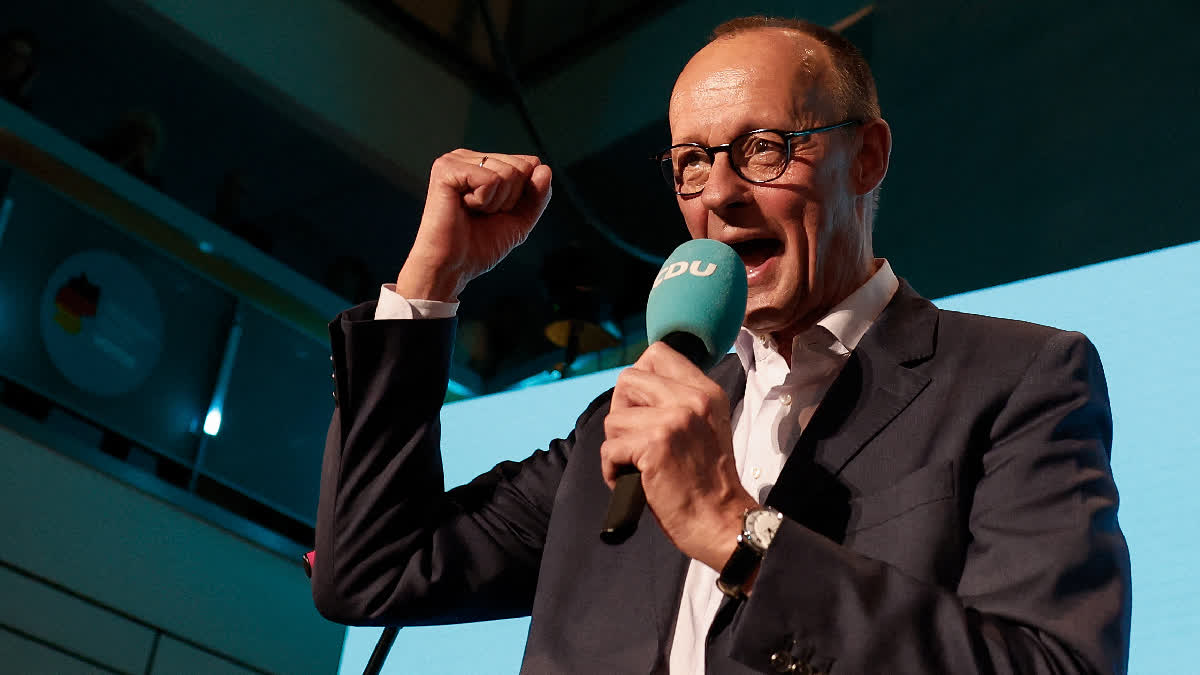Berlin: Germany's conservatives swept to victory in Sunday's elections, with their leader Friedrich Merz set to become the next chancellor, followed by the far-right AfD in second place after record gains.
Merz urged the speedy formation of a new coalition government, warning that as US President Donald Trump is driving rapid and disruptive changes, "the world isn't waiting for us".
He stressed that -- after Trump reached out to Russia and made comments fuelling doubts about the future strength of NATO -- Europe must boost its defence capabilities and said that he has "no illusions at all about what is coming out of America".
The far-right Alternative for Germany (AfD) almost doubled its score to over 20 percent, boosted by fears over immigration and security after a spate of deadly attacks blamed on asylum seekers.
Merz's CDU/CSU alliance won more than 28 percent, according to projections at 2000 GMT, crushing the Social Democrats (SPD) of outgoing Chancellor Olaf Scholz, which were looking at a historic low of 16 percent.
Merz -- a long-time party rival of ex-chancellor Angela Merkel -- has vowed a crackdown on irregular immigration. He hopes to win back votes from the AfD whose rise has stunned many in a country still seeking to atone for its dark Nazi history.
For now, the AfD, basking in the vocal support of key Trump allies, is set to stay in opposition. All other parties have vowed to keep it out of power and behind a "firewall" of non-cooperation.
But its jubilant leader Alice Weidel hailed the "historic" result and again said her party was ready to govern with the CDU/CSU.
"I am very afraid of this shift to the right," said retired teacher Hilke Reichersdorfer, 71, wearing a red scarf outside SPD headquarters. She voiced fears of a situation "like in other European countries or in America".
Trump calls conservatives' victory 'a great day for Germany'
US President Donald Trump on Sunday called the victory of Germany's major conservative alliance "a great day for Germany, and for the United States."
"Much like the USA, the people of Germany got tired of the no common sense agenda, especially on energy and immigration, that has prevailed for so many years," Trump said in an all-caps post on his Truth Social platform.
The conservative CDU/CSU alliance won around 28.5 percent of the vote Sunday, while the far-right Alternative for Germany (AfD) -- strongly embraced by close Trump ally Elon Musk -- scored a surprisingly strong 20 percent.
'Fate of Europe'
Before Merz, 69, takes over, he will have to forge a new coalition government in Europe's top economy, an often drawn-out process he has vowed to complete by Easter.
This threatens to leave Berlin paralysed for weeks to come as Trump has forced head-spinning change and rattled European allies, especially over the Ukraine war.
The German election came amid tectonic upheaval in US-Europe ties sparked by Trump going over the heads of European leaders to make a direct outreach to Russian President Vladimir Putin to end the three-year-old Ukraine war.
"After Donald Trump's statements in the last week it is clear that the Americans are largely indifferent to the fate of Europe," Merz said in a post-election TV debate.
He said his "absolute priority will be to strengthen Europe as quickly as possible so that, step by step, we can really achieve independence from the USA" in defence matters.
To build a majority, Merz may first reach out to the SPD, though without Scholz, who apologised for his party's "bitter" defeat. Merz could also approach the Greens, who scored 12 percent, although the CDU's Bavarian sister party the CSU has so far rejected this.
Another potential partner, the small FDP -- which sparked the November breakup of Scholz's government -- stared down the barrel of narrowly missing the five-percent hurdle to return to parliament.
This would impact the complex parliamentary arithmetic, as would the fate of the far-left BSW, which was just below the threshold late Sunday, at 4.9 percent.
If the BSW eventually scrapes in, this will mean Merz needs two coalition allies -- raising the spectre of yet another ideologically diverse alliance, like the failed alliance that was led by Scholz.
- 'Last chance' -
In a strange twist to the polarised campaign, the AfD has basked in the support of Team Trump, which saw billionaire Elon Musk praising it as the only party that can "save Germany".
Merz said "the interventions from Washington were no less dramatic and impertinent than the interventions we have seen from Moscow, so we are under massive pressure from two sides".
The AfD, strongest in the ex-communist east, also made gains in western states for its best-ever result after Germany was shocked by a series of deadly attacks blamed on migrants.
In December a car-ramming through a Christmas market crowd killed six people and wounded hundreds. A stabbing spree targeting kindergarten children followed, then another car-ramming attack, in Munich, and a knife attack at Berlin's Holocaust memorial.
Merz has argued that the next government must boldly address the AfD's concerns on migration and also fix the ailing economy, warning that otherwise the far right might win next time around.
"The stakes could not be higher", argued political analyst and author Michael Broening. "Germany's mainstream parties have consistently failed to convince voters to reject the far right, and this election could be their last chance to turn the tide."
Democratic forces must find solutions to the country's problems, he added. "If Germany's 'establishment' parties fail to deliver this time, they may not be the establishment for much longer".
Germany's far-right AfD jubilant after 'historic' gains
The far-right Alternative for Germany (AfD) party celebrated a record election result Sunday that fuelled its wildest hopes of one day entering government.
The anti-immigration party scored about 20 percent according to early projections, second only to the conservatives of Friedrich Merz. "We have achieved a historic result," the AfD's top candidate Alice Weidel, 46, told supporters cheering and waving the German national flag at an election night party in Berlin.
For many German citizens and the mainstream parties, it was an anticipated but still shocking result, spelling the death knell for the notion that the country still seeking to atone for the Holocaust was immune to a far right-wing surge.
Attempts to whitewash Germany's Nazi and Holocaust history have prompted state security services to put the party under observation and made it the target of mass street protests.
But Weidel insisted that the party was now "firmly anchored" in the political landscape and had "never been so strong on a national level". She again made overtures Sunday to the CDU/CSU to work together in government, an idea that Merz has vehemently rejected.
Many Germans are deeply worried by the rise of the party that has openly railed against irregular migrants, Islam and multiculturalism. In the social-media-fuelled culture wars increasingly splitting Western liberal democracies, the AfD voices anti-"woke" views, doubts climate change and leans toward Moscow on the Ukraine war.
Russian-linked disinformation campaigns have heavily supported pro-AfD views and narratives. The AfD sometimes insists it is "conservative-libertarian", and the ideological kin of US President Donald Trump, whose cabinet members and billionaire ally Elon Musk have voiced full-throated support for it.
Weidel predicted that if Merz's CDU/CSU continued to refuse to work with her party to "implement the will of the people", the AfD would "overtake" them in the next election.
- 'Alice for Germany' -
Around 200 people gathered to watch exit polls come in at the AfD's local headquarters in Berlin's Pankow district, which was festooned with balloons in the party's signature blue colour.
Cheers and chants of "A-F-D!" went up when the result was announced.
"People are fed up with the politics of the old parties, the prices are going up all the time," said 63-year-old pensioner Karin Kuschy, who has been voting for the party since 2017.
"And we have lots of attacks, people are scared." The AfD has seized on a string of deadly stabbing and car-ramming attacks blamed on asylum seekers to push its demands for more restrictions on immigration.
Arne Maier, a 33-year-old civil servant, said he also supported the Moscow-friendly party's "foreign policy views" and "pro-freedom values". Under Weidel, the AfD has sought to play down some of its harshest nativist and revisionist rhetoric.
During the campaign she was at pains to nudge the AfD further into the mainstream, helped by getting air time in TV debates with the other top candidates.
Nevertheless, the party's choice of "Alice for Germany" as a slogan was seen by some as a dog-whistle to right-wing extremists, given how similar it sounds to the banned Nazi slogan "Alles fuer Deutschland" (Everything for Germany).
Bjoern Hoecke, the party's leader in the state of Thuringia, has been fined twice for using those words. On Sunday night, he was grinning broadly at Weidel's side.
In vast areas of ex-communist eastern Germany, the AfD's heartland, the AfD scored above 30 percent. But in western areas too, a growing number of voters feel the AfD's hardest edges have been softened, in part by Weidel's personal story, which defies some of the party's ultra-conservative "family values" platform.
Weidel lives with a female Sri Lanka-born partner -- with whom she is raising two children, in a town across the border in Switzerland -- and is a Mandarin speaker who during a business career spent several years in China.



